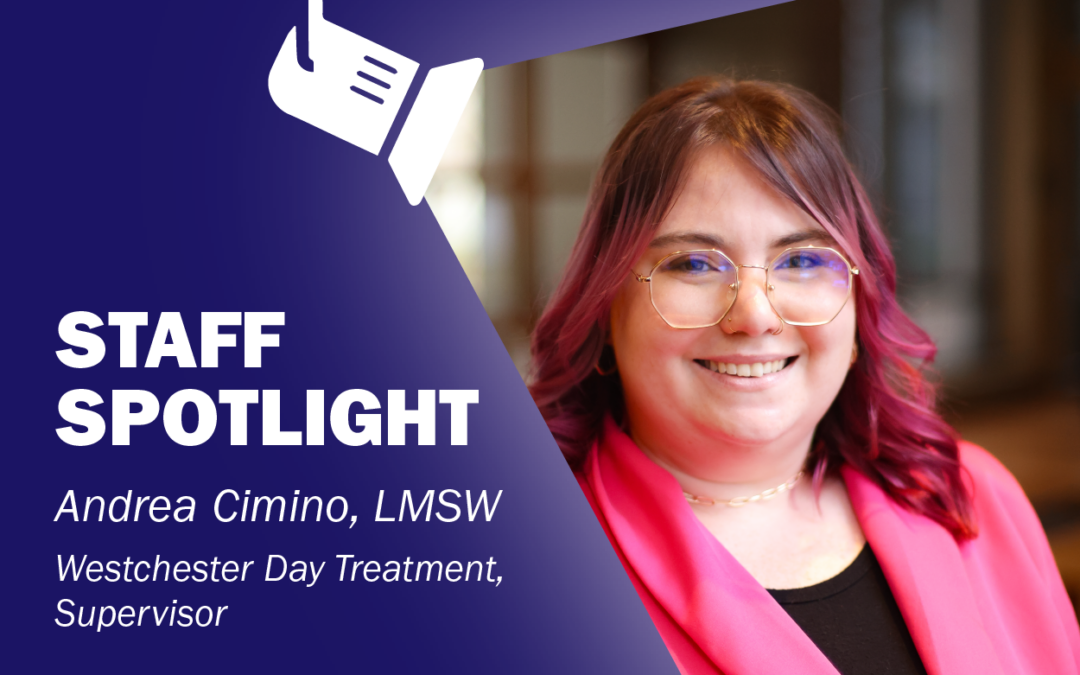We caught up with Andrea Cimino––known to all as Drea––about her work with JCCA’s Westchester Day Treatment program and supporting LGBTQ clients.
How did you find yourself in this field?
Life hasn’t always been kind. Like many of the youth I work with, I’ve had my own experiences with mental health. I had to learn to deal with intense feelings and overcome trauma. I had to break intergenerational pain and dysfunction.
These experiences motivated me, and I developed a motto: be who you needed when you were younger. I studied psychology in college, wanting to learn about myself and my family. I began my career as a mental health worker in a hospital and later discovered social work. It’s been a satisfying journey and the progression feels natural.
How do the experiences you mention inform your approach to young people going through similar things?
It brings perspective. People are trying to survive and will act in any way that feels like it’s helping them survive. Trauma-informed care really clarifies this point. When some see an angry young person they think that’s a bad kid. While most don’t take the time to understand what’s under the surface, it’s our unique role to do exactly that. Maybe that child hasn’t spoken to a parent in months or has been shuffled from one foster home to the next. You bring empathy and try to grasp how destabilizing those experiences are. Their acting out is a way to be heard. In therapy we offer a different way to be heard.
Westchester Day Treatment is a relatively new addition to JCCA’s array of programs. Can you offer a quick introduction?
Of course. We’re a team of clinicians based in Hawthorne Cedar Knolls, a school serving youth ages 5-21 with a range of behavioral needs. While the school provides important services, our team offers a more intensive level of mental health care for students who need extra support to get through the day successfully.
Being in the school means meeting the kids where they are and being able to work with them consistently. Almost all our clients have PTSD diagnoses or carry significant trauma. We also see ADHD, aggression, and oppositional defiance. But no behavior occurs in a bubble. It happens within a complex, highly personal context. Clients and clinicians explore that together.
What do you enjoy most about the work?
I love seeing the smiles and growth and glimmers of hope that come in those moments when a young person recognizes that a different response or behavior is possible.
It’s Pride month and you’re someone keenly aware of LGBTQ experience in your clinical practice.
For many clients, these issues are front and center. I recently spoke to a youth who doesn’t know whether he’s bisexual. He’s wondering about it and feeling nervous. He doesn’t want his friends to dislike him. Kids calling peers “gay” is still a common insult. I can affirm that the wondering is normal, that he’ll figure it out with time, and that it will be OK.
We support LGBTQ clients in advocating for the names and pronouns of their choice. We act as allies with teachers and staff, and help explore family acceptance as well. How can we coexist in a way that’s respectful to the child and maintains the vital bond with family?
What’s next for you and your career?
I ask myself the same thing. I was recently promoted to Supervisor and am about to receive my LCSW, so things are moving forward as hoped. I’d certainly like to continue to expand WDT. Beyond that, I sometimes think about politics and policy. We’ll see!
